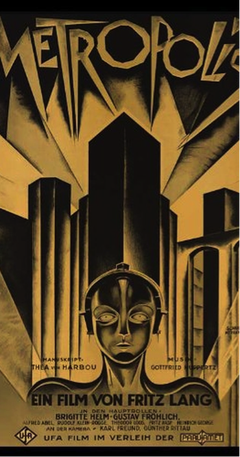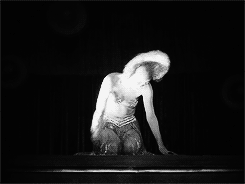Freder: Your magnificent city, Father – and you the brain of this city – and all of us in the city’s light – – and where are the people, father, whose hands built your city – – – ?
Joh Frederson: Where they belong…
Freder: Where they belong…? In the depths…?
In modern times where the only black and white film most people have seen is “Young Frankenstein,” I think “Metropolis” a piece that can get someone more involved in the art form. It is a fascinating look at early conceptions of robotics, and a bizarre film with intriguing sexual angles.
In lists I’ve found online, it’s considered the first film to have an artificially intelligent character. With so many films portraying AI as creatures that develop emotions and individuality over time, it intrigues me immensely that the first time we see an AI in film is an example of a creature without much of a will of its own.
Metropolis is set in the “far future” of the 2020s (100 years ahead of when the film was made). It’s taken the absurd length of putting the workers into an underground city, literally keeping them beneath the rich owners. The film begins with the images of machinery and the lock stepped workers walking to the elevator that brings them to and from work and their underground homes. These men are portrayed as robotic, just working and moving and never swerving from their orders. The film contrasts these robotic men who choose to revolt and the literally robotic Machine Man’s slavery to the will of its creator.
When we see the robot, it seems to be much more like the AI we have today than the AI we often see in fiction. By that, I mean that it appears to be a pure machine without a mind and only takes orders, but is still able to make autonomous decisions. When the ruler of the city uses it to take the form of the leader of the labor revolt, Maria, the robot shows some very intelligent actions. It’s like a self-driving car, able to make choices that we have programmed into it to make like speaking and walking, but doesn’t “know” that it exists and doesn’t try to do something other than what we want it to do. This is the fundamental break between intelligence and sentience. The robot in “Metropolis” is intelligent like a self-driving car, while Wall-E is sentient like a human being.
 Look at him! He just wants love!
Look at him! He just wants love!
This film makes a great starting point for any discussion of AI and gender. A surprisingly large number of AI films portray a highly sexualized female AI character, and the Machine-Maria in “Metropolis” is as over the top sexualized as you can get.

This dance brings the movie to compare her to the Whore of Babylon, and its curvaceous movements are directly contrasted to the virginal real Maria. This automaton is expressing these gender traits because its creator copied a woman’s body onto it and that they helped it accomplish the destruction of the city’s machinery. I don’t believe this creature actually thinks for itself or has a conception of its own gender. I’ll be addressing those subjects again in the future as they appear so often in AI films.
“Metropolis” isn’t an exceptionally deep film. It pretty clearly makes the statement that communist revolution harms everyone as much as outright capitalist oppression, and we need a mediator to increase the standard of living for workers. That simple message is one that has been seen for many decades before the film was produced. But hidden within is an interesting precursor of the themes of automatons replacing workers, even if this robot takes a more active destruction of the workers than the passive replacement model seen in other films.
Advertisements Share this:




